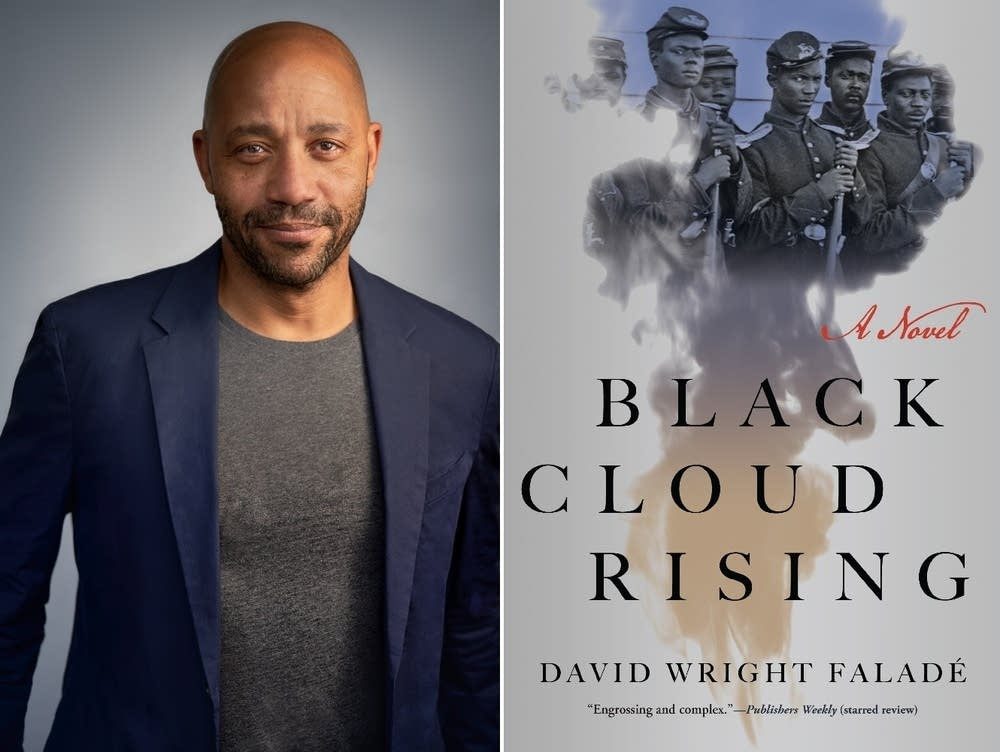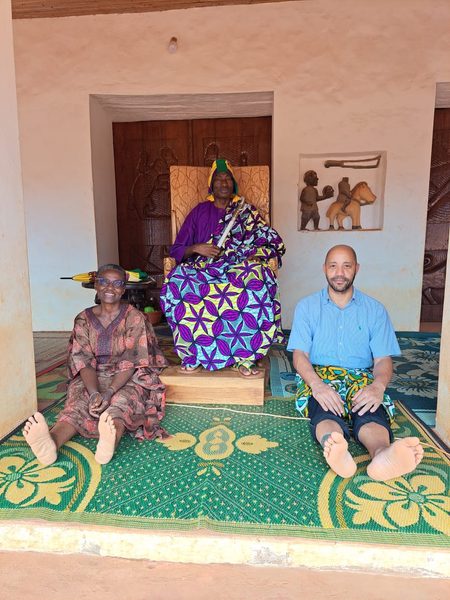
David Wright Faladé ’86 is a professor of English at the University of Illinois, focuses on African-American Literature, Contemporary American Literature, and Fiction, and was a 2021-2022 Dorothy and Lewis B. Cullman Center Fellow at the New York Public Library. He is the co-author of the young adult novel Away Running and the nonfiction book Fire on the Beach: Recovering the Lost Story of Richard Etheridge and the Pea Island Lifesavers, which was a New Yorker notable selection and a St. Louis-Dispatch Best Book of 2001. He also wrote the screenplay for Rescue Men, a documentary film describing the Pea Island legacy. The recipient of the Zora Neale Hurston/Richard Wright Award, he has written for the New Yorker, Village Voice, Southern Review, Newsday, and more.
It is my understanding that you graduated from Carleton in 1986. During your time at Carleton, did you participate in any Off-Campus Studies Programs?
Yes, I went on the Pau program, which I don’t know if it still exists, but it was a Carleton program to Pau in the southwest of France. This program worked differently in that there were two programs, one was a semester-long program and the other was a program that was led by a Carleton professor and uniquely for Carleton students – there were 23 of us. The program existed to complete the language requirement. We did French 3 and 4 in the one trimester there which was a great way to complete the requirement. I went my first year which was less common. It was mostly upperclassmen, but there were three of us that were first years.
Was going on this OCS your first time traveling?
My mom was French and I was born in France, but we came to the United States when I was like a year and a half old and that is where I grew up. We didn’t speak French at home. When I was 7 to 8 we lived in France for a year and I picked it up again but when we came home again we just didn’t speak it at home. So when I got to Carleton (I came from a really small town in West Texas) there was just so much I didn’t know – I didn’t even know there was going to be a language requirement – but in my mind I was like I’ll just take the French placement test. Worst case I’ll just get out of French one. I didn’t know anything. I was sitting in that auditorium with this paper test in front of me and I remembered two words – I remembered maison and oiseau. So, I started in French one, but the advantage was I had an ear, so I didn’t know anything but I could fake it better and that carried me a long way.
Reflecting back on this OCS travel experience, how was it traveling more independently for the first time? Did it affect your perspective going forward?
It was completely formative. Like I said, I came from a small town in West Texas in 1982 to Minnesota by myself at the last minute. That felt like an adventure already, but going to France was so different, especially with older folks. My dear friend – and we’re still friends now – was a junior on the program. They were just other young folks who were older than me and more adventurous. They were going to hitchhike to the coast or were going to hitchhike to the mountains and ski. So I’m like ohhh so that actually happens, people actually do this. In that way, while I’ve always been a fairly independent person, it opened up my understanding of what that actually meant on a personal level. You also gain a certain self-absurdness that, again, I thought I had, but it was just really different. We were also living with families which was great. The family I lived with was always there for me, but also didn’t try to overprotect me in any way, so it allowed me to mature personally. That certainly would have happened at Carleton too, but this way it was in other circumstances that mattered – just being in the world in that way. While I love Paris (I lived there for four years after Carleton) not being in Paris was kind of great too. Pau is a small city that has the cityness of it, but it is more manageable. Again, being a small town kid, and at that point I was only 7 months removed from it, Pau allowed me to understand the world as bigger but not be overwhelmed by it.
You also participated in Fulbright after Carleton right? How did that come about? Was it related to your OCS experience?
It was not exactly related to my study abroad. My life has been a little catch as catch can in a good way. Carleton itself, going from the small town I grew up in to Northfield, already felt like a big leap. Honestly, before Pau a part of me thought I was going to leave and transfer schools and go back to Texas. I loved it but it was disorienting and I was failing miserably in classes. I did really well in Pau which helped in that way, but after Pau I also recognized there was more to learn.
Subsequently, after I graduated, I worked in the admissions office for a year and that helped me since I didn’t know what I wanted to do. Then, I ended up living abroad for five years and it was the combination of Carleton and the study abroad in Pau that pushed me there. As I was living abroad I didn’t have Fulbright in mind – not even sure I could have gotten one at that point – and I didn’t know about it. Pau and that off-campus experience really gave me the confidence and the ability, and Carleton fostered that curiosity that allowed me to go – yeah I don’t know what I want to do but I have these possibilities by going abroad – and I just followed that. Had I gone to the University of Texas, which was the other alternative, I’m not sure it would have played out that way.
Fast forward a few years, I come back to the States and go to grad school and I start to teach, write, and publish. It was more at that point that I became aware of the Fulbright. I was working on a project that was partially in Brazil, so I thought let’s see if I can get part of this fellowship in Brazil. I was lucky and I got it and it allowed me to be in Brazil for 9 months. In the end, it was really the foundational stuff from Carleton that set me up for it.
What would you say was the main thing you took away from the Carleton OCS or the Fulbright that has impacted you and that you would want to share with others?
My whole Carleton experience was very foundational. I teach at a big state school now and it’s a great job and I feel very fortunate to have it, but I teach like I was taught at Carleton. I approach it like I’m teaching liberal arts and liberal arts values. The subject matter, whether it be a creative writing workshop or cultural studies or a literature class, is the lens through which we are going to get those values: fostering curiosity, learning to write and speak well, and thinking critically. When I came to Carleton, I didn’t know what a liberal arts education was. I mean, I really stumbled on it. As I figured it out, it totally made sense to me and I totally embraced it because I understood it would lead me towards a life that I wanted to lead. It was really formative and foundational since I thought I was going to college at the University of Texas where I thought I was going to major in engineering, become an engineer, and then be an engineer. While coming out of Carleton, I had no idea what I wanted to do, but I felt so prepared to do it, and that was the difference. I didn’t know I wanted to be a writer and I had no idea I would become a professor, but I felt so prepared to do the things that would be meaningful for me as a person and as a human being. I credit that to Carleton and part of the Carleton piece was going to Pau my first year.
If you were leading an OCS program, where would you take students and why?
I actually have! I teach this course called “Slavery and Identity”. I led it first at this small college I taught at, and then I’ve done it at the University of Illinois once. We study the history of slavery in the United States through this lens of the experience of it – if one can do that. We read some historical texts, but also fiction and watch films to try and get at that piece. Then we went to the slave coast. So that was a long way of saying I’ve led an off-campus program where we went to what was formerly called the “slave coast”. The first time I led the group, we went to Ghana and what is now Benin. The two other times I’ve led it we went just to Benin. We spent two or three weeks there. In Dahomey, it turns out I have people from there I found out later in life, they’re very invested, especially now, in resuscitating that history. There are just wonderful sights to see, in a very difficult way, but super rich. So overall the goal of the program is trying to connect slavery as it was understood from that side of the Atlantic, and then how it was experienced and understood here in an American context.
What advice would you give students to encourage them to study abroad? What benefits do you see to the experience?
Whether or not a student ends up traveling later, being able to do it as a student as part of your undergraduate education allows you to travel in a more structured way. I would encourage all folks to travel. A) It’s great and it’s fun to experience something. B) We are better people and better citizens by having a broader view of the world than just our little slice of it. Beginning to do that in the context of your undergraduate education allows you to do it in this structured way that for me just opened it up. If I had just gone in the summer, as opposed to going that spring trimester of my first year, it would’ve been completely different because I didn’t have that structure and I didn’t know how to travel. Traveling with others in this structured way was just invaluable. We can all travel, especially now the world has gotten smaller, tickets are more affordable, but doing it with this structure just made it that much better.




